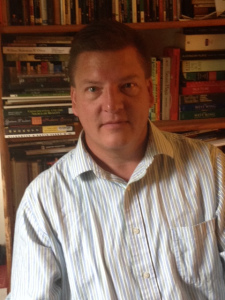
We interviewed Ken Jaworoski about his play “Pulse.”
Ken Jaworowski is an editor and critic for The New York Times. His plays “Never Missed a Day,” “Certain Souls” and “Believers” have been produced by the WorkShop Theater Company in Manhattan and elsewhere, and his full-length play “Interchange” has been published by Broadway Play Publishing. His collection of short plays, “Acts of Redemption,” was produced at the 2015 Edinburgh Fringe Festival.
Can you tell us about the process of writing your new play, Pulse?
I never seem to have a plan when writing a play. I just find a story and follow it. Two of the plots in “Pulse” had real-life inspirations. One was when a neighbor told me his son was being bullied in school and wondered aloud if he should teach the boy to fight, i.e., if violence could be the answer. Perhaps it could, perhaps it couldn’t, I didn’t know. So I started on that story to consider what might happen.
Separately, one night at a party a gay friend told me about his coming out when he was 16 or so. He’d confessed to his parents, and the next day they’d ordered him to leave their house. This horrified me, and I began to think of my own family, which, when I was growing up, was quite conservative. If I had been gay, how would they have reacted? I followed that question and started to write. Later, I added a third piece, and together they became “Pulse.”
What do you want the audience to come away with?
I hope to tell a good story. If I can do that, and give the actors something interesting to work with, my job is done. Some writers secure a theme or a moral, then work backward. I’m the opposite – if I can tell an interesting tale, everything else is secondary. I’d like to foster a big idea, sure. But first and foremost, I’d love for the audience to be wrapped up in the plot, and to get a few laughs out of the deal.
Can you tell us a bit about your background and why you started writing plays?
As a kid, I’d write my own short stories, and later, in graduate school, I was told I could submit a creative thesis rather than a research paper. I figured I’ll write a play. I’m pretty sure that the play was terrible – I don’t have the guts to go back and read it! – but it was fun enough to write, so I said, I’m going to try that again. I did, and that next play was produced by the Gallery Theater in Brooklyn. Off I went.
In addition to being a playwright, you are also an editor and theater critic for The New York Times. How does your work as a critic influence your playwriting?
I see a lot of theater. For the past 15 or so years, I’ve seen as many as 50 shows a year. The range of shows runs from the banal to the brilliant. The bad ones have me grumbling, ‘My God, I can write better than that!’ The great ones have me thinking, ‘Oh, I wish I could write half as good as that.’
What inspires you?
I’ve had enough of books and plays about upper-middle-class people with petty and easy-to-solve problems. I’m inspired by flawed people who have few resources, yet still strive to find dignity and beauty and wonder in their days.
What kind of theatre excites you?
Sorry to beat the same drum again, but I love great stories and monologues. Conor McPherson can put a person onstage, recounting a minor incident in his life, and I’ll feel like the world has shifted. Also, plays like ‘A Day in the Death of Joe Egg’ and ‘’Night, Mother’ break my heart, no matter how many times I read or see them.
What advice do you have for playwrights starting out?
Everyone seems to give the same advice (‘Write what you know!’ ‘Work hard!’) so I’ll go against the grain and say: See some bad or problematic theater. Think ‘I can write better than that,’ and then go, and write better than that. Also, if you’re working at a job you hate or are stuck in a situation that upsets you, congratulations – you’ve just found the best topic for your next play. David Mamet wrote ‘Glengarry Glen Ross’ after some very unfortunate job choices. And Eugene O’Neill’s real-life tragedies fueled his genius.
Lastly, there are no unbreakable rules in theater, but there is one rock-solid guideline: Remember your audience.
What projects are you working on now?
We’re working on getting my new full-length play, ‘The Patron Saints,’ onstage soon at the WorkShop Theater in Manhattan.
